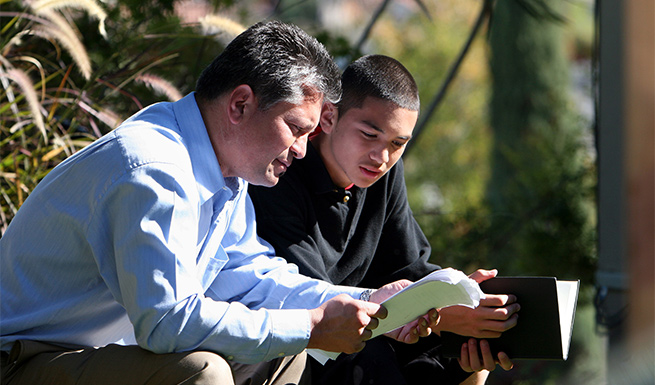Maria is frustrated. As a 17-year-old transition age foster youth, the system isn’t working for her. She’s repeatedly talked to counselors about her family situation — the substance abuse that led to the physical violence — and shared her life story. But she doesn’t feel like they hear her needs or know her goals. And she’s not empowered to advocate for herself because she lacks communication and social skills.
A new collaboration between San Diego Center for Children, Just in Time for Foster Youth (JIT) and The San Diego Foundation aims to eliminate system-related barriers to help youth like Maria more easily achieve financial security, self-sufficiency and a sense of lasting well-being.
Helping Foster Youth Thrive
San Diego Center for Children President & CEO Moises Baron and Just in Time for Foster Youth Executive Director Don Wells are the architects of the Foster Youth Transitions Collaborative. The goal of the collaborative is clear: successful transition of foster youth ages 15 through 26 to adulthood and independence.
“This collaborative program demonstrates the passion and commitment of our organizations and supporters who are so dedicated to the youth we serve and transition from foster care to self-sufficiency and well-being,” said Don.
Many youth enter the foster care system with histories of complex trauma including physical, mental and emotional abuse, involvement in the commercial sexual exploitation of children (CSEC), gang involvement, substance use, and domestic violence.
Currently, youth services and adult services are separated, making it difficult to provide consistent resources that are integrated and customized to address the unique needs of foster youth as they grow up. This results in duplications in services and siloed systems that don’t collaborate regarding the needs of these vulnerable youth through young adulthood.
Innovating the System
Through the collaborative, a first-of-its-kind protocol has been developed that will assess foster youth needs early upon system entry and offer integrated and holistic services with programs that are trauma informed and age- and developmentally-appropriate until self-sufficiency and well-being are achieved.
Transition-age foster youth complete a comprehensive online assessment to identify their transition goals and needs. The result is a customized, web-based transition plan foster youth can access 24/7 to share with care providers and advocates.
The plan includes goals related to independent living skills; housing; education and career; health and mental health services; planning and implementation skills; and communication and social skills.
Youth are then paired with a coach with lived experience to help coordinate needed support. The web-based platform also allows tracking of outcomes and data gathering to identify needs and service gaps.
Funding the Vision
“When Moises and Don shared their vision for the collaborative, we recognized its potential to help more San Diego youth thrive,” said Mark Stuart, President & CEO of The San Diego Foundation. “The program is a unique, innovative opportunity to try a new approach in foster care that could result in significant impact.”
San Diego Center for Children and Just in Time have established a goal to raise $1 million to fund the program. They opened a charitable fund at The San Diego Foundation, which contributed the first $25,000 donation.
San Diegans and businesses can support the effort with a donation, and nonprofits who serve foster youth are encouraged to join the collaborative and explore how all system-related nonprofit organizations can better serve transition age foster youth.




